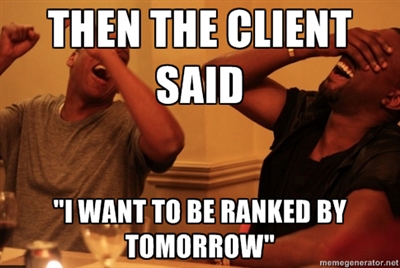
I come from a background of technical IT related work rather than internet marketing/SEO, so the majority of SEO was new to me. The last time I had done anything close to what you could call SEO was my webpage design class back in high school. I remember learning about how to construct a webpage, how to make the page look “good”, and how meta tags are SUPER important.
Oh, how things have changed.
My first few days in SEO were filled with a constant stream of new information while I franticly tried to retain at least 25% of it. But this is to be expected with anything new. Over time I retained more and more, but works best for me is to do it myself. It’s one thing to read about link building. It’s another thing to do it yourself and it’s not easy, especially as a noob.
On-page optimization always made a lot of sense to me since I had a web page background, but link building was completely new. It’s easy to look back and say, “Wow, I don’t know why I had a hard time understanding this.” But as a noob it’s hard to wade through all the possibilities for link building. This was one concept that took me a while to wrap my head around. There is no “correct” answer or “set way” to build links or rank #1. I was used to exact procedures to accomplish a task. In classes there was usually one correct answer to a problem. When a computer breaks or gets a virus, there is a procedure to fix it. However, in SEO, this isn’t the case. Yes, there are a few things you will do for all your clients, like on-page optimization. But most of the time a different strategy per client is more effective, depending on what kind of client/site you are working with.

I remember starting the outreach for my first guest posting campaign. I was thinking it would be easy and I would pick up links left and right. I soon found out that it would end up being a lot harder. I found some blog prospects for where I thought I could get a post up. But something good link builders may take for granted, is that a noob won’t necessarily know how to approach a blogger. At first, to me, it wasn’t about building a relationship. It was just about getting a link up. Chances are the blogger will have no interest in that, and there won’t be a very high success rate. I also didn’t expect any bloggers to want payment or simply just never respond. Often when I’m training someone or teaching somebody something new I just assume that they will know things because it’s “easy”(This is probably why I’m a horrible teacher). But it’s important to know a new person will always have some difficulties with things that seem simple to you.
SEO is always changing.
The Mighty Dictator (Google) is always updating algorithms and cracking down on those who disobey their “laws”. So as SEO’ers we have to make sure we aren’t doing anything illegal or, especially after Penguin, spammy. Moral of the story? Don’t piss Google off, and you’ll be happy too.
Something I like to do is think about my tactics from someone else’s perspective. For example: if out of nowhere I go from 2 links a day to 200, would that look natural to you? The answer is: no, of course not.
As Google changes, so do we. This is one of the things I like about SEO. There is always something new to learn or adapt to, which keeps life interesting. Who wants to do the same boring, tedious work all day? Not me. It’s the striving for new ways of doing things or coming up with an effective link building idea that makes SEO fun.
Some advice: Read, Read, Read.
There are so many SEO blogs and resources out there – Read them!
For me, there’s no better way to spark ideas for link building than to read about what other people are doing and relate it back to our client/niche. It’s not stealing ideas, it’s borrowing ideas. I’ve found that SEO’ers have a friendly community that loves sharing ideas with each other, which is simply not the case for other kinds of work. It is also a great way to find out what’s going on with Google, issues that others are facing, and SEO news.
Reading articles/blogs is something I definitely resisted at first. Excuses like: I hate reading, there isn’t enough time, blah blah blah, etc. But if you don’t read and keep up with current events, your strategies will become stale and ineffective. For those of us who don’t have the most creative minds in the world there is no better way to come up with new ideas. Did I mention you should read?
Recommended Resources for newbies
- The Beginner’s Guide to SEO – SEOmoz
- How To Train a Link Builder – Peter Attia
- SEO Glossary – SEOBook


Great article David.
I’m really interested to know what other people use to train their new hires who are either A) COMPLETELY new to SEO or B) have some other background/training that might not still be up to date or in line with their new agencies guidelines.
David,
As a starting point I like to refer people to four different resources:
1) Google SEO Starter Guide
2) Google Webmaster Guidelines
3) SEOMoz SEO Guide
4) Search Engine Land SEO Guide
I think they represent a good spread of introductory knowledge that is easy to consume and mixed with the rule book by Google helps them understand that it isn’t a free for all online, which has repercussions if you don’t play nicely.
Al.
Hi Al,
Thanks for the resources!
– David
Hi David,
It is so refreshing to hear a newbie perspective. I was there not too long ago, and it’s nice to know that not all SEOs out there are 15 year veterans.
I like all the beginner’s guides that have been listed above. We also have one on our website that I wrote (and I think it’s pretty awesome!). 🙂
Keep up the good work!
Thanks Tabita!
You could share few Link Building strategies which are Panda and Penguin friendly.
Hi Mahesh,
Panda and specifically Penguin are targeting sites with thin/bad content and over optimized backlinks (exact kw, no variation, footer links, blogroll, etc).
A few link building techniques that are still good are going to be
– natural editorial links (“in sentence”) and include a brand + KW or even several words. For instance, post-penguin you’d want to say something like ZoomSpring SEO is a company from Cincinnati instead of just using “Cincinnati SEO company”
– Guest posts are good because you’ll get a high authority link (if you choose the right sites) and it’ll normally just be 1 link and 1 linking root domain, not a blogroll that gets you 1,000 links but only 1 linking root domain.
Hope some of that helps
Yes… I read the same suggestions everywhere (especially the diversified anchor texts) and it makes perfect sense.